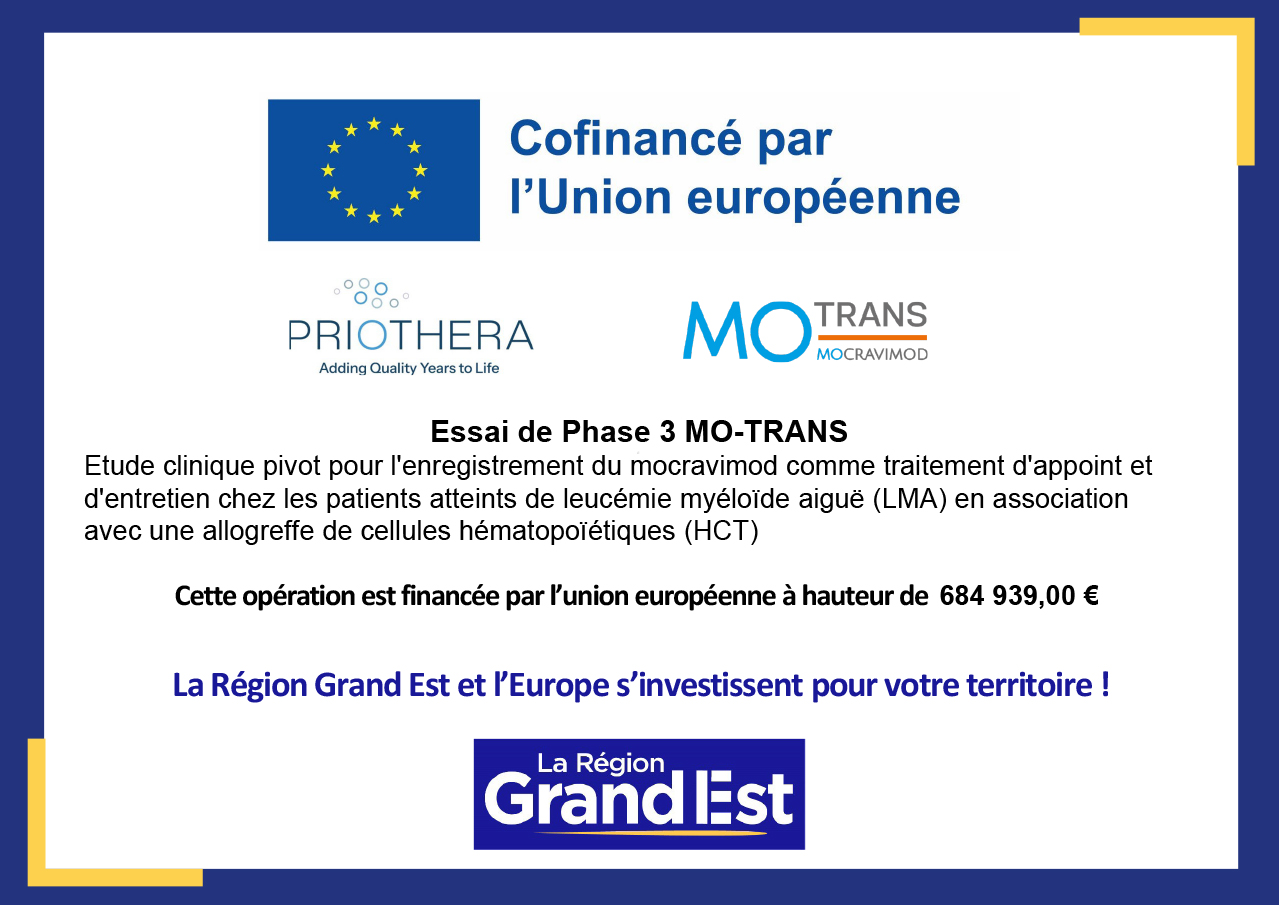Mocravimod as Adjunctive and Maintenance Treatment in AML Patients Undergoing Allo-HCT (MO-TRANS Study)
Status
Active
NCT05429632

Title
Randomized, double-blind, placebo-controlled, multicenter Phase III study to evaluate the efficacy and safety of mocravimod as adjunctive and maintenance treatment in adult AML patients undergoing allogeneic HCT.

Study Overview
Allogeneic HCT is a standard treatment of curative intent for AML. A major limitation for successful outcome of allogeneic HCT is disease relapse. The graft-versus-leukemia (GvL) effect is also critical to prevent disease relapse and is mediated by donor T cells contained in the HCT graft that trigger immune responses against leukemic cells.
Mocravimod is an oral S1P receptor (S1PR) modulator that blocks lymphocyte egress from lymphoid organs via its phosphorylated active metabolite. Mocravimod’s potential to preserve the desirable GvL effect while decreasing GvHD is a promising way to maintain the prospect of a cure while decreasing transplant-related mortality (TRM) and morbidity in AML patients undergoing allogeneic HCT.
Study Design
This is a multicenter, randomized, double-blinded, placebo-controlled trial.
Purpose
The purpose of this pivotal study is to assess the efficacy and safety of mocravimod compared to standard of care as an adjunctive and maintenance treatment for allogeneic hematopoietic cell transplantation (HCT). Mocravimod is administered in addition to standard of care GvHD prophylaxis in adult high-risk AML patients.

Who May Participate
Age & Sex
Males and females
Age 18-75
No healthy volunteers
Diagnosis
Adult AML undergoing first allogeneic HCT
Conditions
High or intermediate risk AML in CR1,
or any risk AML in CR2
Study Details
Status
Active
Locations
Study Type
Study Phase
Phase III
Product
Oral mocravimod
Sponsor
Eligibility
Inclusion
- Diagnosis of AML (excluding acute promyelocytic leukemia) according to the WHO 2022 classification of AML and related precursor neoplasm, including AML with myelodysplasia-related gene mutations.
- European Leukemia Net (ELN) high-risk or intermediate-risk AML in CR1, or AML of any risk in CR2, [CRi] is also allowable.
- Planned allogeneic HCT from fully matched related or unrelated donor with no more than one antigen mismatch or planned use of haploidentical donor using PBSC graft.
- Any conditioning regimen with a Transplant Conditioning Intensity (TCI) score ≥ 1.5.
- Planned use of a calcineurin inhibitor based prophylaxis.
- Age ≥ 18 years and ≤ 75 years.
- Eastern Cooperative Oncology Group (ECOG) performance status of 0 or 1.
Exclusion
- Use of anti-thymocyte globulin (ATG), alemtuzumab, abatacept for GvHD prophylaxis.
- Diagnosis of macular edema during screening.
- Cardiac/pulmonary/hepatic/renal dysfunction.
- Hepatic dysfunction as defined by aspartate aminotransferase (AST) and/or alanine aminotransferase (ALT) > 2.5 x upper limit of normal (ULN); or total bilirubin > 1.5 mg/dL.
- Renal dysfunction with estimated creatinine clearance < 45 mL/min by the Cockcroft-Gault formula.
Study Locations

